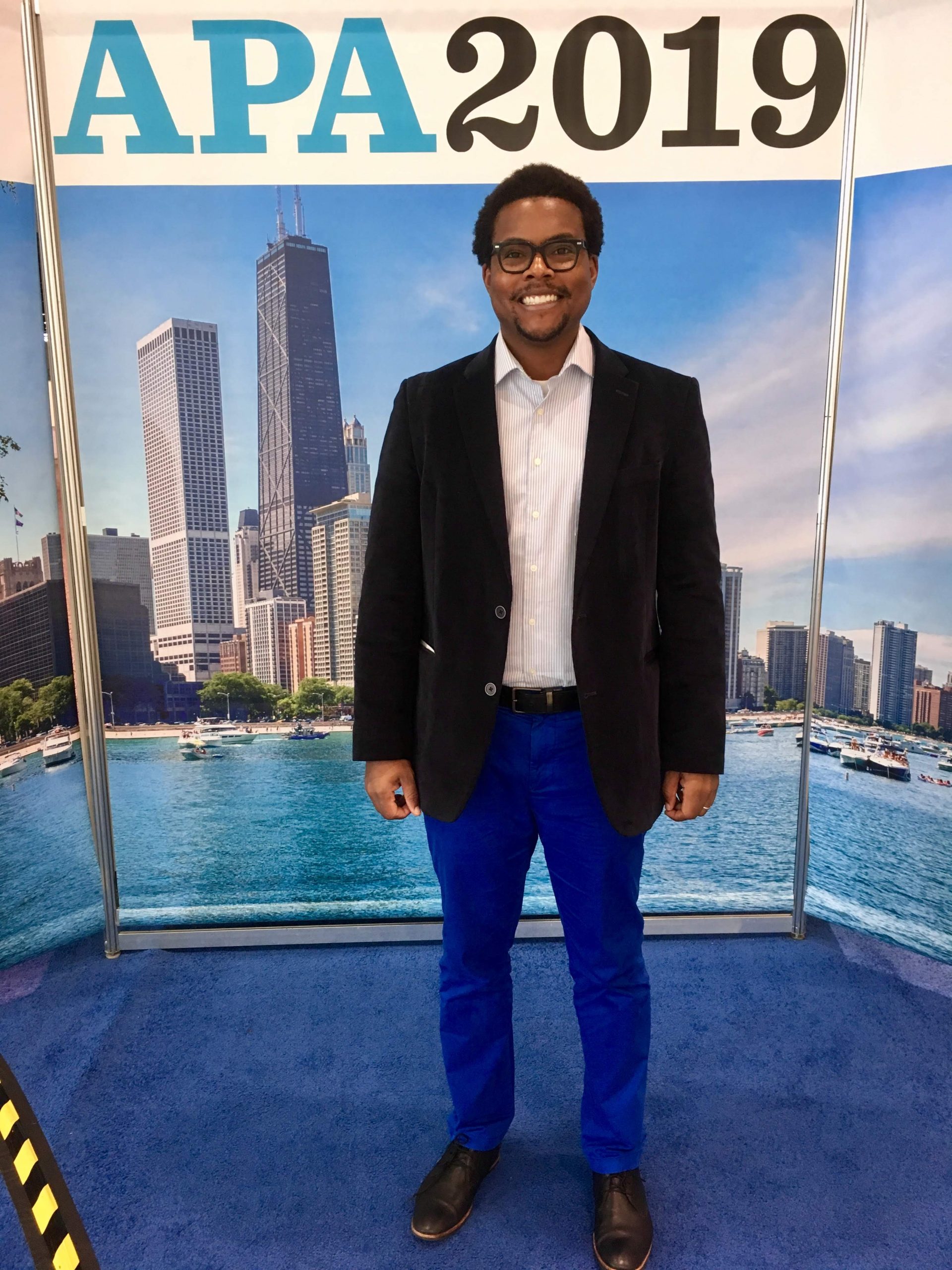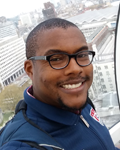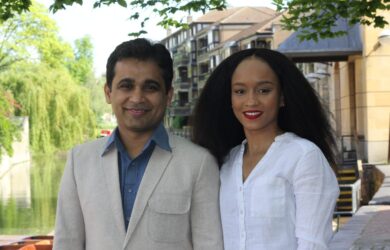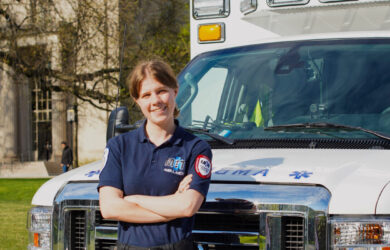
Rob Rivers talks about his work with underrepresented groups and his NGO which involves educational outreach in Peru and Bolivia.
Too often some of the most talented individuals in our workforce either don’t have opportunities or access and it is one of my missions to ensure that talent is not squandered based on zip code, race or whether someone has extra home life responsibilities.
Rob Rivers
Rob Rivers has always had a strong desire to give back and that fits well with his time at the University of Cambridge as a Gates Cambridge Scholar and with his role in the Gates Cambridge Alumni Association.
Now he not only heads the National Institute of Diabetes and Digestive and Kidney Diseases’ STEP-UP programme for underrepresented groups and works to encourage students to pursue careers in biomedical research, but outside of work he also runs a community building NGO in Peru and Bolivia with his wife.
Early years
Rob [2003] was born in Fort Bragg, North Carolina, where his father was serving in the army. When his father retired from army life, the family moved to Kentucky where Rob went to high school where he excelled in a wide range of classes. He thought he would go into the army like his father and then to enter politics, but life sometimes doesn’t go to plan. Just before he left high school and having been accepted at West Point, Rob was in a car accident, resulting in him losing full movement in his left hand. That made him ineligible for the army and forced a huge rethink about his future.
He applied late to Kentucky State University, a historically black university, and won a scholarship covering his tuition fees. His new plan was to study history and then go to law school. However, he was forced to rethink again after his early experiences of history lectures. He switched to chemistry, a subject he had always done well at, and stopped making grand plans.
During his undergraduate course, Rob spent a summer doing research on DNA methylation and decided research and teaching were something he was keen to pursue, feeling it was an area where he could make a difference and open up pathways for underrepresented groups in science.
Cambridge
In his final year he applied to Cambridge University to do a PhD in Chemistry. He was keen to study under the late Professor Sir Christopher Dobson, an international expert in Alzheimer’s and Parkinson’s diseases. During his degree course, he had also met a chemistry researcher from the university who had mentioned a fairly new scholarship programme that he might be interested in, the Gates Cambridge Scholarship.
Rob started his PhD at Cambridge in 2003 when he was in the first cohort to benefit from the Gates Cambridge Scholars Council’s orientation course which helps scholars to link up with each other, often leading to the formation of strong friendships. Rob says he still has several friends from that time and that Gates Cambridge has been an invaluable network for him. It was also important given the culture shock of coming from a historically black university to a faculty with very few people of African descent.
Rob says having access to three different networks at Cambridge – through his College, his Department and Gates Cambridge – made him look at issues in a different way, something he describes as “very powerful”. It also gave him an interdisciplinary perspective and Gates Cambridge’s emphasis on making a difference had a long-lasting impact.
On the academic front, Rob had to adjust to the British approach to PhDs which puts an emphasis on the student deciding what they want to study. He was also unprepared for the politics involved in selecting a topic for research, but eventually focused on researching a protein linked to Parkinson’s Disease which led to two subsequent published papers.
NGO
After Cambridge, Rob took a gap year and volunteered in Peru for a non-profit organisation, teaching maths and science to children. “I needed a break, but it gave me another view about what I could do to make a difference,” he says. “It was a good awakening.”
There he met Yenny Delgado, now his wife, and together they started an NGO after he returned to the US. The Umbrella Initiatives Foundation aims to promote community development and transformation through a focus on justice and health education. The organisation raises funds for indigenous community projects with a primary focus on education but also environmental justices as a result of fires in the Amazon rainforest. Having lived in the region and worked with community groups there Rob and his wife have built up a high level of trust on the ground, but are able to leverage their networks in the US [the Presbyterian Church as well as their peer group] to raise much needed funds, for instance, to address the impact of forest fires in the region. Rob and Yenny travel to the region regularly.
National Institutes of Health
At the same time as he was setting up the Foundation, Rob took up a two-year AAAS Science and Technology Policy Fellowship at the National Institutes of Health. The programme is designed to foster relationships between federal decision-makers and scientific and engineering professionals in the public policy arena and to communicate policy and biomedical and behavioural research issues to a wide audience.
Rob’s first role in the NIH was at the National Cancer Institute where he worked as a health science administrator. His role involved helping the Institute to decide on funding research on cancer proteomics. He also assisted in the development of a new funding Programme Announcement.
After five years, he had a good sense of how government works and how to influence decision makers in the federal space, but felt that he wanted to return to his original motivation to make a difference through encouraging people from underrepresented groups to get into science. Having managed, coordinated and developed metrics and assessment tools for training programmes for individuals from underrepresented backgrounds at the National Cancer Institute, he applied to the National Institute of Diabetes and Digestive and Kidney Diseases [NIDDK]. “These are the most chronic and costly diseases in the US and it was important to me that those who bear the most burden are also on the frontline in addressing them,” says Rob.
Underrepresented groups
He was appointed Director of programmes that aim to increase the participation of underrepresented groups in scientific research in 2015 and has been actively involved in a long-term evaluation of the NIDDK's Short-Term Research Experience for Underrepresented Persons (STEP-UP) Programme and in overseeing its annual summer research programme for high school and undergraduate students from underrepresented groups. Each year around 165 students attend the programme and Rob says the evaluation shows around a third go on to do scientific research. “The programme offers students the opportunity to actually be in the lab, turning things that are often discussed in a theoretical sense into something concrete,” he says. Additionally, he oversees research funding opportunities that focus on NIDDK research areas for both graduate students and post-doctoral researchers.
Rob is also widening the reach of biomedical research through heading a Re-Entry Supplement programme for the institute; for instance, reaching out to those who may have dropped out of science due to caring responsibilities. “We are trying to think more holistically about how we bring people back in and how we build their skillset back up,” he says. “Too often some of the most talented individuals in our workforce either don’t have opportunities or access and it is really one of my missions to ensure that talent is not squandered based on zip code, race or whether someone has extra home life responsibilities,” says Rob.
While he has been working, Rob has also kept in touch with the Gates Cambridge community and was co-chair of the Gates Cambridge Alumni Association with Rebecca Saunderson until 2018. He says: “It’s really cool to stay connected to Gates Cambridge alumni. It gives me a chance to catch up and to relive all those stimulating formal hall conversations.”

Robert Rivers
- Alumni
- United States
- 2003 PhD Chemistry
- Clare College












